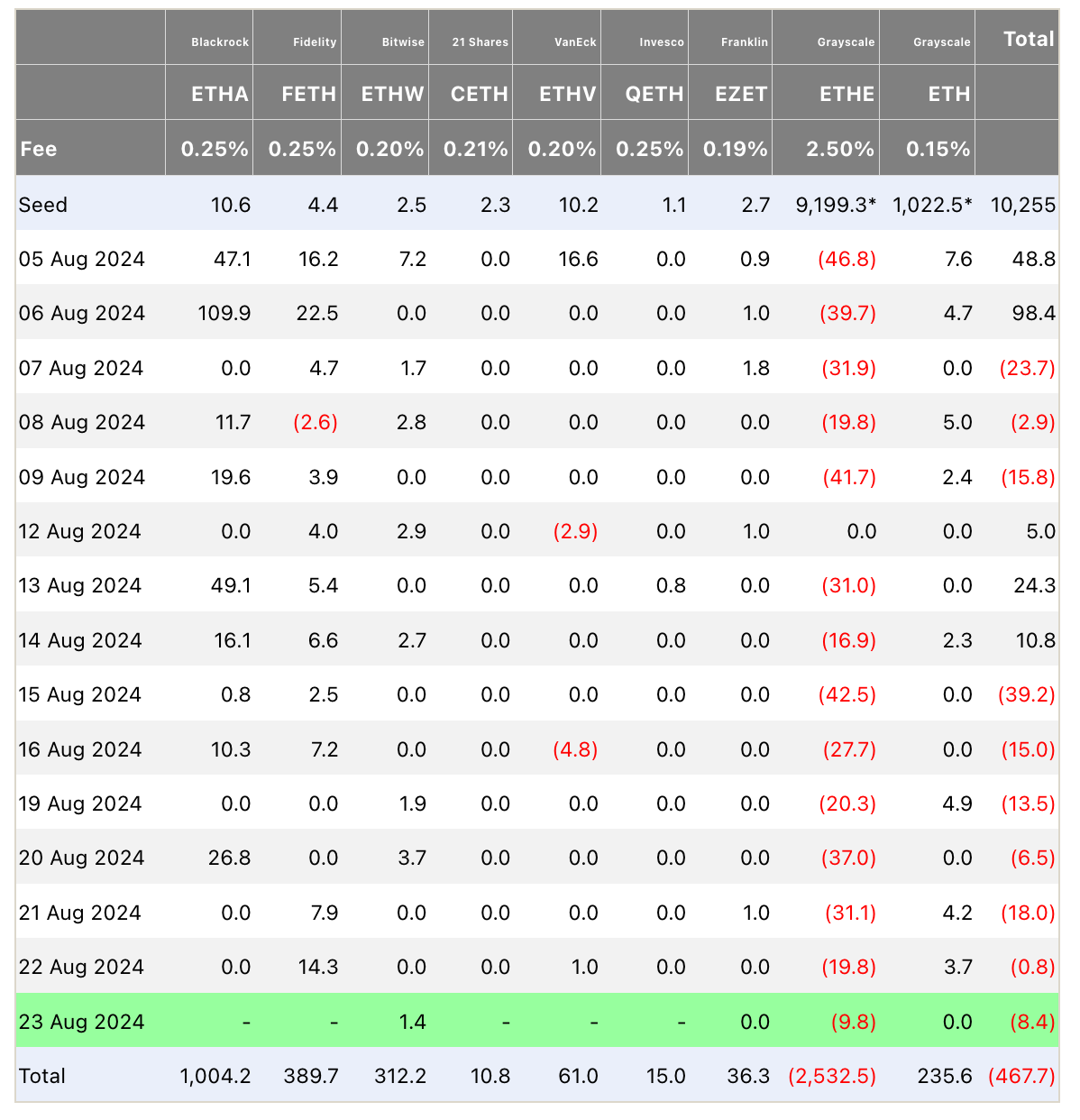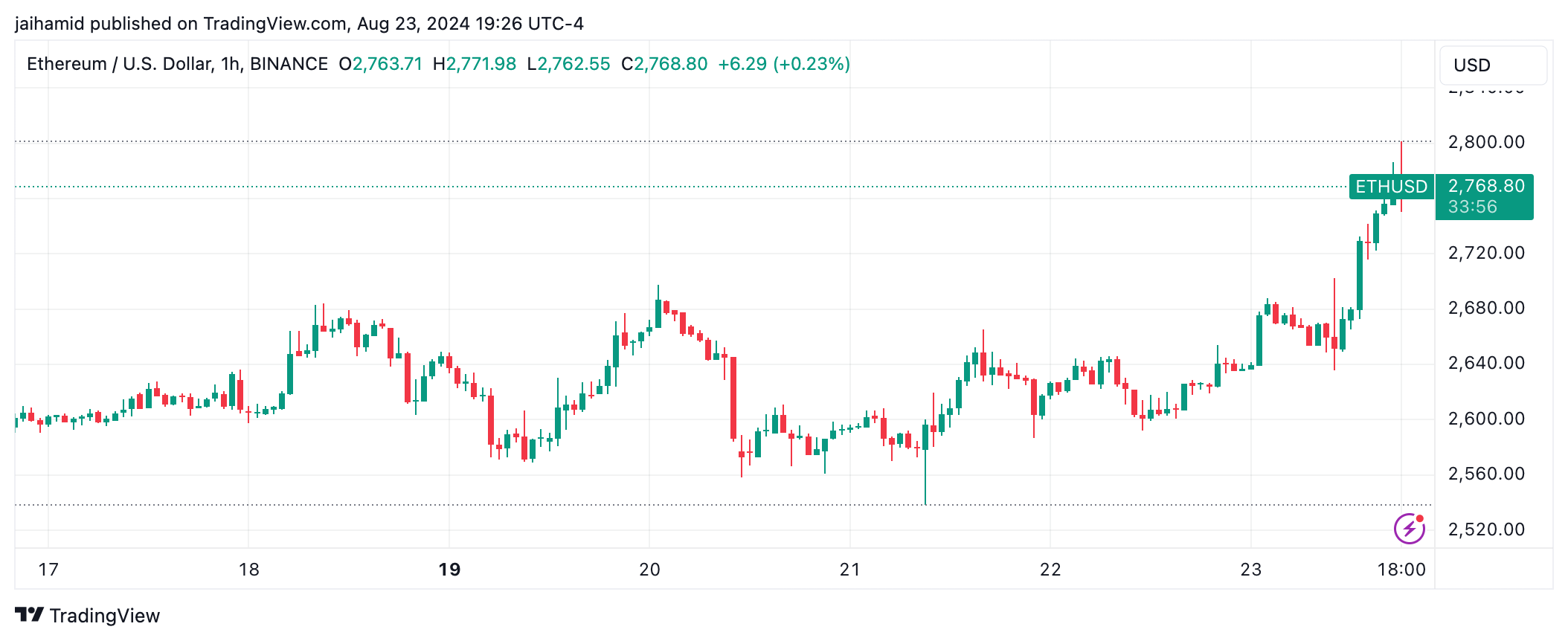Happy one month-anniversary to spot Ethereum ETFs!

It’s been a month since spot Ethereum ETFs launched in the U.S., and let’s just say things haven’t gone exactly as planned. Investors, it seems, aren’t as pumped as everyone hoped they would be.
The nine ETFs that hold Ethereum directly have been experiencing outflows for six straight days. Since their launch, these funds have been bleeding cash, while Bitcoin ETFs, in contrast, have been enjoying a steady stream of inflows.
Talk about a tale of two cryptos.
Just today, the Grayscale Mini Bitcoin ETF raked in $51 million. Meanwhile, Ether ETFs are struggling. It took years of fighting with regulators to get ETFs that are backed by actual Bitcoin and Ether.

But now that they’re here, it looks like investors aren’t biting—at least, not on the Ethereum side. In fact, over the first three weeks, Ether ETFs saw millions in outflows, partly because the Grayscale Ethereum Trust, which converted into an ETF, saw investors steadily cashing out.
We’re talking about $458 million in net outflows. Matthew Sigel, head of digital assets research at VanEck, said that:
“Volumes have collapsed across all venues this week and Grayscale outflows continue. We’ve seen a total sentiment and positioning reset that should bode well for September and October.”
Bold prediction, Matthew. Bold prediction.
The SEC gave Ethereum ETFs the go-ahead, but not without some side-eye. Ethereum’s shift to a proof-of-stake model hasn’t exactly won everyone over.
Some see it as a riskier move compared to Bitcoin, which, in the eyes of many, remains the more stable asset.
Then there’s market sentiment. Simply put, people just seem to be more into Bitcoin. The numbers back it up: Bitcoin’s price has shot up by 61.1% this year, compared to Ethereum’s 41.8%.
Bitcoin has always been seen as the heavyweight champ of crypto, while Ethereum is more like the scrappy underdog still trying to prove itself.
Now let’s talk about the operational side of things, too. Spot Ethereum ETFs aren’t exactly the model of efficiency right now. They have to use cash for creations and redemptions instead of the more efficient in-kind process that Bitcoin ETFs use.

This can lead to higher costs and tracking errors, which aren’t exactly attractive selling points for potential investors. Nobody wants to deal with extra fees or the risk of not perfectly mirroring the price of Ethereum, especially when there are smoother options on the table.
And let’s not forget about profit-taking. Some investors likely jumped into Ethereum ETFs right away, caught up in the initial hype, but when the price didn’t skyrocket, they decided to cash out and move on.
We’ve seen this pattern before with Bitcoin. After its ETF launch, there was a big burst of excitement, followed by a wave of selling. Now, it seems like Ethereum is going through the same motions, causing it to underperform compared to Bitcoin. Only worse.




 Bitcoin
Bitcoin  Ethereum
Ethereum  Tether
Tether  USDC
USDC  Dogecoin
Dogecoin  TRON
TRON  Cardano
Cardano  Stellar
Stellar  Chainlink
Chainlink  Hedera
Hedera  Bitcoin Cash
Bitcoin Cash  Litecoin
Litecoin  LEO Token
LEO Token  Monero
Monero  Cronos
Cronos  Dai
Dai  Ethereum Classic
Ethereum Classic  OKB
OKB  Algorand
Algorand  VeChain
VeChain  Cosmos Hub
Cosmos Hub  Gate
Gate  KuCoin
KuCoin  Stacks
Stacks  Tezos
Tezos  Theta Network
Theta Network  IOTA
IOTA  Tether Gold
Tether Gold  Zcash
Zcash  TrueUSD
TrueUSD  NEO
NEO  Polygon
Polygon  Decred
Decred  Dash
Dash  Ravencoin
Ravencoin  Qtum
Qtum  Basic Attention
Basic Attention  Zilliqa
Zilliqa  0x Protocol
0x Protocol  Synthetix Network
Synthetix Network  Holo
Holo  Siacoin
Siacoin  DigiByte
DigiByte  Enjin Coin
Enjin Coin  Ontology
Ontology  Nano
Nano  Status
Status  Hive
Hive  Waves
Waves  Lisk
Lisk  Steem
Steem  Numeraire
Numeraire  Pax Dollar
Pax Dollar  BUSD
BUSD  Huobi
Huobi  NEM
NEM  OMG Network
OMG Network  Bitcoin Gold
Bitcoin Gold  Ren
Ren  Bitcoin Diamond
Bitcoin Diamond  Augur
Augur